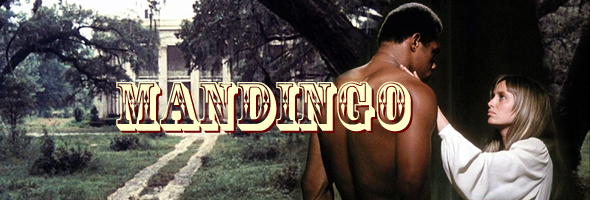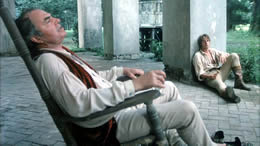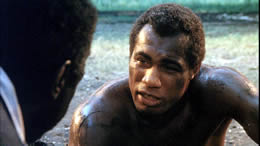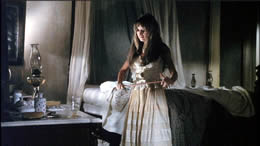

 Deep in the American South in the middle of the 19th Century, the decrepit, morally diseased plantation of Falconhurst is run by aging patriarch Warren Maxwell (Mason) and his limping son, Hammond (King), who enjoys partaking of the slave women when he isn't aiding his father with the sale and purchases of their human property. Despite Hammond's objections, he's married off to a seemingly respectable white woman, Blanche (George), who turns out to have a particularly depraved secret that comes to light after their disastrous wedding night. As tensions boil in the household, Hammond finds solace in the arms of his favorite female slave, Ellen (Sykes), while the increasingly deranged Blanche blackmails the house's "prize buck," Mede (Norton), into satisfying her in the bedroom. Much violence, screaming, and mayhem ensue.
Deep in the American South in the middle of the 19th Century, the decrepit, morally diseased plantation of Falconhurst is run by aging patriarch Warren Maxwell (Mason) and his limping son, Hammond (King), who enjoys partaking of the slave women when he isn't aiding his father with the sale and purchases of their human property. Despite Hammond's objections, he's married off to a seemingly respectable white woman, Blanche (George), who turns out to have a particularly depraved secret that comes to light after their disastrous wedding night. As tensions boil in the household, Hammond finds solace in the arms of his favorite female slave, Ellen (Sykes), while the increasingly deranged Blanche blackmails the house's "prize buck," Mede (Norton), into satisfying her in the bedroom. Much violence, screaming, and mayhem ensue.
 While it's possible to approach Mandingo now without any advance warning, it's far easier to take in context with popular culture at the time. The incredibly lurid source novel by Kyle Onstott, the first in his bestselling string of Falconhurst epics (with only one sequel, Drum, to be filmed later), seemed like a logical project for the big screen given the fact that it's basically a cousin to the often-adapted works of Harold Robbins, Jacqueline Susann, and Jackie Collins, with a hefty dose of then-controversial interracial sex. Of course, that particular taboo was far more incendiary on film since it involved actual actors doing love scenes that could be banned in several states at the time; as recently as 1969, Raquel Welch and Jim Brown had stirred up a storm of controversy with their incredibly tame romance in 100 Rifles. However, Mandingo was shepherded to the screen by Dino De Laurentiis, a man to whom good taste was only a fleeting acquaintance. Thus this adaptation pulled no punches as it inundated viewers with gory violence, nasty whippings and beatings, extensive nudity of nearly every cast member under 35, and a jaw-dropping climax that still elicits shrieks when seen today. Critics were merciless in their attacks upon its release, and a slew of imitations and parodies ran rampant for the rest of the decade. Regardless of critical scorn, the film proved extremely profitable for Paramount and became a very popular item on cable and VHS before political correctness took over and kept it out of circulation on DVD for most of the format's duration.
While it's possible to approach Mandingo now without any advance warning, it's far easier to take in context with popular culture at the time. The incredibly lurid source novel by Kyle Onstott, the first in his bestselling string of Falconhurst epics (with only one sequel, Drum, to be filmed later), seemed like a logical project for the big screen given the fact that it's basically a cousin to the often-adapted works of Harold Robbins, Jacqueline Susann, and Jackie Collins, with a hefty dose of then-controversial interracial sex. Of course, that particular taboo was far more incendiary on film since it involved actual actors doing love scenes that could be banned in several states at the time; as recently as 1969, Raquel Welch and Jim Brown had stirred up a storm of controversy with their incredibly tame romance in 100 Rifles. However, Mandingo was shepherded to the screen by Dino De Laurentiis, a man to whom good taste was only a fleeting acquaintance. Thus this adaptation pulled no punches as it inundated viewers with gory violence, nasty whippings and beatings, extensive nudity of nearly every cast member under 35, and a jaw-dropping climax that still elicits shrieks when seen today. Critics were merciless in their attacks upon its release, and a slew of imitations and parodies ran rampant for the rest of the decade. Regardless of critical scorn, the film proved extremely profitable for Paramount and became a very popular item on cable and VHS before political correctness took over and kept it out of circulation on DVD for most of the format's duration.
 Seen today, Mandingo is, if nothing else, utterly fascinating. As a statement on race relations and moral hypocrisy, it's actually more potent today than most of its sermonizing brethren thanks to its utter absence of preaching or emotive grandstanding; director Richard Fleischer never comes close to pulling a Stanley Kramer here, much to his credit. Likewise, King and Sykes are actually very good in their roles, creating a complex, interesting relationship in what amounts to a fairly compact amount of screen time. On the other hand, camp fanatics can have a field day with James Mason, who spends most of his screen time using little slave boys as foot stools to cure his rheumatism. It might have sounded shocking on the page, but onscreen it's so over the top that most viewers can only react with disbelieving howls. Then there's Susan George, one of the '70s' most abused female stars after the likes of Straw Dogs and Fright. General consensus seems to be that her love scenes with boxer Ken Norton essentially killed off her Hollywood career, but her wild-eyed performance and deeply eccentric Southern belle accent might have had something to do with it, too. Say what you will, but Susan really hurls herself into this character with an abandon rarely seen and constantly veers between scenery-chewing hilarity and deeply terrifying madness. So, is Mandingo deeply offensive, strangely moving, excessively overwrought, or deeply fascinating? All of the above, naturally.
Seen today, Mandingo is, if nothing else, utterly fascinating. As a statement on race relations and moral hypocrisy, it's actually more potent today than most of its sermonizing brethren thanks to its utter absence of preaching or emotive grandstanding; director Richard Fleischer never comes close to pulling a Stanley Kramer here, much to his credit. Likewise, King and Sykes are actually very good in their roles, creating a complex, interesting relationship in what amounts to a fairly compact amount of screen time. On the other hand, camp fanatics can have a field day with James Mason, who spends most of his screen time using little slave boys as foot stools to cure his rheumatism. It might have sounded shocking on the page, but onscreen it's so over the top that most viewers can only react with disbelieving howls. Then there's Susan George, one of the '70s' most abused female stars after the likes of Straw Dogs and Fright. General consensus seems to be that her love scenes with boxer Ken Norton essentially killed off her Hollywood career, but her wild-eyed performance and deeply eccentric Southern belle accent might have had something to do with it, too. Say what you will, but Susan really hurls herself into this character with an abandon rarely seen and constantly veers between scenery-chewing hilarity and deeply terrifying madness. So, is Mandingo deeply offensive, strangely moving, excessively overwrought, or deeply fascinating? All of the above, naturally.
Though it was always shown uncut on home video in America, Mandingo had a much rougher fate abroad. Many repertory prints still surviving today are actually sourced from Great Britain, where some whipping footage and, most damningly, all of the pitchforking during the last scene was roughly spliced out to get an X certificate. Elsewhere a bizarre variant was also prepared with five minutes of violence and sex removed and numerous alternate clothed takes substituted for local tastes, and this cut was actually the first one officially released anywhere in the world courtesy of Universal Germany, which also featured the original American trailer. (A bootleg DVD also circulated for years in the U.S., most widely in certain New York video outlets, but it's a shoddy copy of the open matte, soft-looking VHS.) Eventually Paramount decided to hand off most of its catalog to outside companies, and Legend Films issued Mandingo in an uncut, attractive, but no-frills DVD. Their subsequent Blu-Ray release is also uncut and considerably sharper, which is generally a good thing even if it winds up exposing a lot of white specks and debris that were almost invisible in standard def. The daylight scenes all look sharp and colorful, while interiors are dependent on the amount of natural light available and whether zoom lenses were employed (about a third of the time, thus the occasional increased graininess). It's definitely miles ahead of any print you'll see circulating, and while it can't touch the work of, say Shout! Factory's Roger Corman titles from the same vintage, this is still a welcome release and worth the incredibly cheap price. Only one extra is included, a still gallery version of the original pressbook; if ever a movie demanded some special features for context, this is it.
![]()